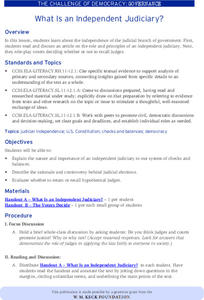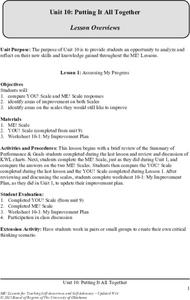Facing History and Ourselves
Taking Ownership of the Law
The work of building and maintaining a democracy is, in the words of Justice William Hastie, "never finished." To better understand what Hastie sees as an ongoing building process, class members listen to a seven-minute podcast about two...
Facing History and Ourselves
Insights on Democracy from South Africa
As part of their study of democracy, high schoolers listen to a podcast featuring two South African educators and their efforts to support the process of transforming the nation from apartheid rule into a democracy. Learners also read...
Facing History and Ourselves
Citizen Power Makes Democracy Work
Eric Liu's formula "power plus character equals citizenship" and his three strategies to making change happen model for high schoolers how to develop citizen power, how to get involved and participate to make democracy work. Class...
Facing History and Ourselves
Defining Democracy
For democracies, it is both the best and the worst of times. As part of a study of the challenges facing democracies, young political scientists seek first to define democracy, and then to consider the relationship between democracy and...
University of Oklahoma
Learning About Special Education
The lessons in the second unit in a three-unit series provide students with the historical background of disability education. After reading about events that impacted attitudes towards disabilities and how learners are identified for...
University of Oklahoma
Improving My Communication Skills
The two lessons in the fifth unit in this series are designed to help students with disabilities improve their communication skills. The first lesson has class members practice strategies and skills for appropriate communication. They...
Constitutional Rights Foundation
What Is Constitutional Democracy?
Rediscover the values at the heart of American democracy and what makes it unique with your pupils. Use a reading and discussion questions—in addition to an analytical activity—on the preamble to the Constitution. An additional activity...
Constitutional Rights Foundation
The Troubled Elections of 1796 and 1800
Congress does more than create new laws. Political scientists delve into the elections of 1796 and 1800 to understand how political parties, the Electoral College, and personal agendas affected the election process. The resource also...
Constitutional Rights Foundation
The Iran Nuclear Deal and Its Critics
What was the purpose of the Iranian Nuclear Deal? An insightful resource explains nuclear tensions in the Middle East and Iranian weapon development that contributed to the Nuclear Deal in 2013. Academics learn the agreement limited...
Constitutional Rights Foundation
Global Warming and the Paris Agreement
Global warming: a political debate or a scientific fact? Young historians read text, complete activities, and participate in group discussion to understand the political debate surrounding global warming and the US decision to withdraw...
Constitutional Rights Foundation
Automation and the American Worker
A thought-provoking resource examines the future of automation and the effects on employment. Academics read informational text, complete written prompts, and participate in activities to understand automation and the possibilities for...
Constitutional Rights Foundation
Winner-Take-All: The Two-Party System
Two's company, three's a crowd. High school historians learn about the Electoral College, a two-party, winner-take-all voting system in the United States. The instructional activity explains the pros and cons of the two-party system,...
Constitutional Rights Foundation
Why Don’t More People in the U.S. Vote?
To vote or not to vote, that is the question. Secondary scholars explore voter turnout in the United States. The resource uses informational text, group discussion, and a worksheet to help academics understand hindrances to voting and...
Constitutional Rights Foundation
Suppressing the Vote
Voting rights have expanded over time, but some voters are still being suppressed. A thought-provoking resource explores the history of voter suppression in the US and efforts to remove roadblocks to voting. Young historians learn about...
Constitutional Rights Foundation
Purged From the Voter Rolls: Husted v. A. Philip Randolph Institute
Once a registered voter isn't always a registered voter. Academics explore the topic of voter registration and hindrances to remaining registered. The resource focuses on data analysis, federal voter registration law, and Supreme Court...
Constitutional Rights Foundation
Slavery and the Electoral College
How did slavery mold the creation of the US Constitution? The final lesson in the series focuses on how slavery impacted the creation of the Electoral College. Academics learn how the Electoral College was created because Southern states...
Constitutional Rights Foundation
What Is an Independent Judiciary?
While justice is supposed to be blind, it doesn't always follow the rules. Using a reading on the independent judiciary and case studies, learners consider what to do with judges who rule in their own self-interest rather than on behalf...
Constitutional Rights Foundation
The Census in US History
The census has been a part of the American landscape since the Constitution was written; however, it does have a history of controversy. Class members use a guided reading and simulation activity on developing census questions to...
Teaching Tolerance
Using Photographs to Teach Social Justice | Exposing Gender Bias
Young sociologists are asked to read two photographs, identifying how the photographer uses point of view, color, pose, light, and shadow to express a stereotype of women or to challenge those stereotypes. Partners then create their own...
University of Oklahoma
Putting It All Together: Assessing My Progress and Portfolio
Celebration time! The final unit in a 10-unit series asks learners to review their work and assess their progress. They complete another YOU! Scale and ME! Scale worksheet and compare the results with the worksheets they created at the...
University of Oklahoma
Advocating For My Needs After High School
A three-lesson unit teaches learners with special needs how to advocate for their needs after high school. Class members review appropriate was to disclose their disability during interviews and applications, and how to request...
University of Oklahoma
Developing My Resources
Learners with special needs create Summary of Performance (SOP), a written document which describes their disability, its impact on their daily life, ways they have learned to compensate, their personal strengths, and their goals. The...
University of Oklahoma
Increasing My Self-Awareness
After watching a PowerPoint about famous people with disabilities, class members begin a Self-Awareness research project about their own abilities and disabilities. Included in the project is information about people who have similar...
University of Oklahoma
Understanding My Rights and Responsibilities
Three scripted lessons comprise a unit designed to inform special needs students about their rights and responsibilities in high school. In the first lesson class members examine the Individuals with Disabilities Act (IDEA), Child Find,...

























